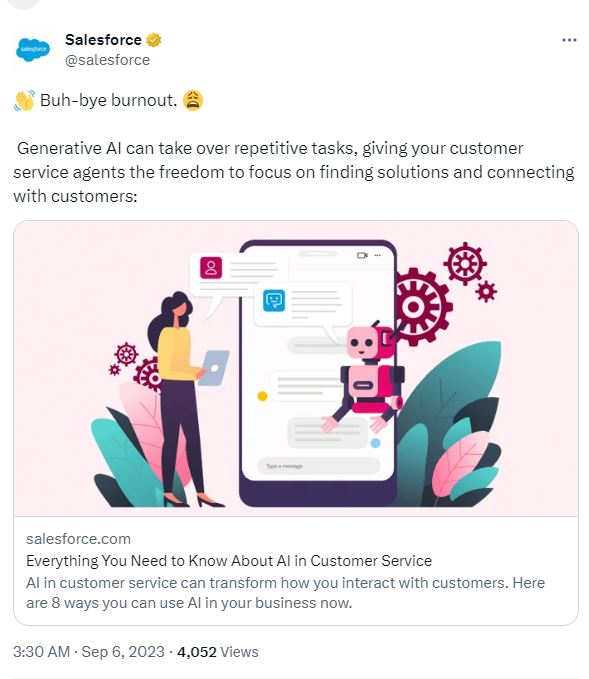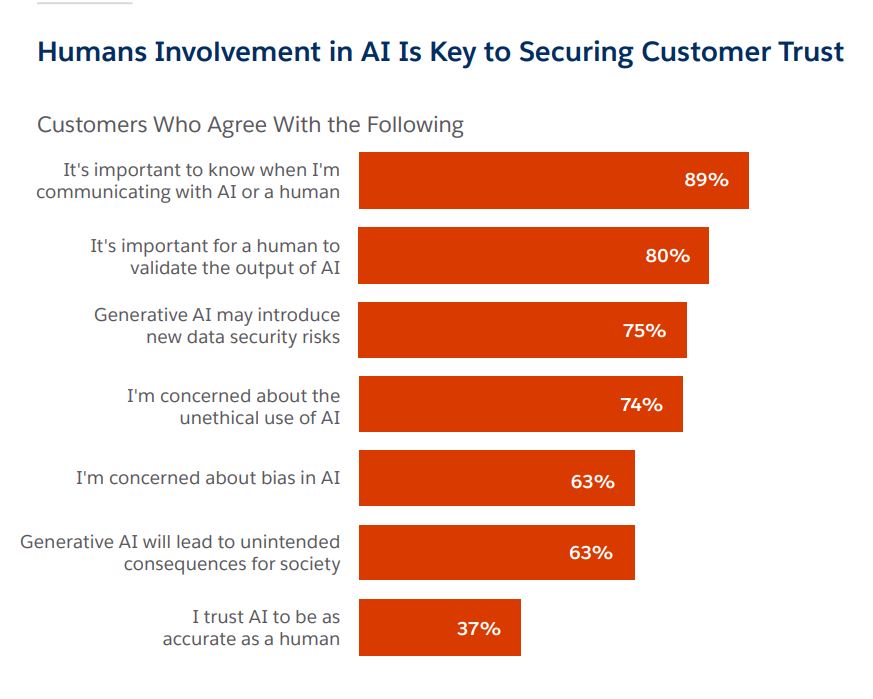
It’s all about understanding customers. (Image – Shutterstock)
It’s all about trust for AI in customer service
- AI in customer service can help businesses understand customers better.
- However, 79% of customers in Singapore are concerned about companies using AI unethically.
- Millennials and Gen Z have a generally brighter view of generative AI than baby boomers and Gen X.
Artificial intelligence (AI) is firmly on the agenda for most businesses today. While AI has been implemented in customer service for some time through chatbots, some businesses still struggle to deliver customer satisfaction, especially when the technology is not able to cope with demand.
As the demand for better customer experience grows, generative AI in customer service can provide businesses an opportunity to understand and serve customers better. In fact, the market for generative AI in customer service is expected to surpass US$2.8 billion by 2032 from US$304 million in 2022.
Given the popularity of ChatGPT, OpenAI’s generative AI chatbot which was unveiled in November 2022, more businesses have embraced the technology. Tech companies providing AI in customer service have also used the technology to enhance their offerings, providing multiple options for businesses to not only perfect their customer experience but also understand customers better.
However, there are still some concerns about the impact AI can have on customers. For one, the use of generative AI by some organizations has already been questioned, especially in terms of how the AI sources its data to generate results. Some organizations have even banned their employees from using generative AI applications like ChatGPT.

Generative AI in customer service can help prevent burnout.
Understanding customers
A report from Salesforce indicates that businesses could soon face an “AI trust gap” with customers as more are becoming concerned about the unethical use of the technology. The State of Connected Customer report, which surveyed more than 14,000 customers and business buyers across 25 countries, revealed that nearly three-quarters of businesses have customers who are concerned about the use of AI.
According to the report, customer priorities, behaviors and expectations are changing because of economic and technological shifts. However, the pressure will be on brands to step up and address the trust gap. In Singapore, 53% of customers expect companies to meet their changing needs. Furthermore, 85% of customers in Singapore expect faster service, and 78% expect better personalization as technology advances.
At the same time, 78% of customers in Singapore expect consistent interactions across departments and 76% expect to interact with someone immediately when they contact a company. As such, the experience remains crucial amid bargain-seeking. Brands have ample opportunity to compete on more than price.
Yet, despite the use of technology to understand customers better, 62% of consumers in Singapore switched brands at least once in the past year. The leading reason for switching brands is the quest for better deals as well as the demand for product quality.
More importantly, 85% of consumers in Singapore say the experience a company provides is just as important as its products and services. However, many companies fall short. 66% of customers in Singapore say most companies treat them as a number, rather than a unique individual.

Customers want to know if they are interacting with a human or an AI. (Image – Shutterstock)
Generative AI in customer service
When it comes to generative AI in customer service, there is no doubt that customers are curious about the technology. As generative AI programs like ChatGPT, Bing and others have already created an understanding of how the technology works, customers would definitely like to experience them as well.
However, the top three customer sentiments around generative AI in Singapore are curiosity, excitement and hope. But breaking down these sentiments into age groups reveals something different.
The report revealed that millennials and Gen Z have a generally brighter view of generative AI than baby boomers and Gen X. This suggests that brands deploying generative AI for a broad customer base will need to tailor their messaging for different demographics and prepare for varying levels of uptake and reception.
Gen Z customers also stand out for their willingness to take their money elsewhere in search of brands that better reflect their priorities. In the past year, 59% of Gen Z consumers switched brands, far exceeding older generations and introducing a new battleground for customer loyalty. Gen Z customers are also nearly twice as likely as baby boomers to switch brands to those that better align with their personal values, showing the importance for brands to tap into what guides this group’s beliefs.

Most people are concerned about the implications of generative AI on data security, ethics, and bias. (Source – Salesforce)
Do customers trust AI?
“As brands find new ways to keep up with rising customer expectations, they must also consider diverse viewpoints among their base,” said Michael Affronti, SVP & GM, Commerce Cloud, Salesforce. “Leading with strong values and ethical use of emerging technologies like generative AI will be a key indicator of future success.”
The report echoes Affronti’s comments. As trust is paramount for the use of any emerging technology, customers expect transparency as companies ramp up their use of AI. In Singapore, 66% of customers say advances in AI make it more important that companies are trustworthy.
A whopping 79% of customers in Singapore are concerned that companies may use AI unethically. Additionally, 87% say it’s important to know whether they’re communicating with an AI or a human, and 64% state that greater visibility into how AI is used would deepen their trust.
“Rising customer expectations mean companies can’t afford to stand still when it comes to customer service. Technologies such as AI hold immense potential for businesses to keep up with changing needs and preferences. But this also raises pressing concerns around the ethics of AI,” said Sujith Abraham, Senior Vice President and General Manager for Salesforce ASEAN.
“The trust imperative is now more important than ever. Companies that will succeed are those that demonstrate they are approaching the technology thoughtfully, grounded in transparency and security, to win the trust of their customers.”
READ MORE
- Safer Automation: How Sophic and Firmus Succeeded in Malaysia with MDEC’s Support
- Privilege granted, not gained: Intelligent authorization for enhanced infrastructure productivity
- Low-Code produces the Proof-of-Possibilities
- New Wearables Enable Staff to Work Faster and Safer
- Experts weigh in on Oracle’s departure from adland






